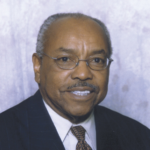Many blacks in leadership positions have been either silent during the week of mourning for the death of President Ronald Reagan or bitter in their criticism of the man. A commentary posted on BET.com said, “Reagan began a sustained attack on the government’s civil rights apparatus, opened an assault on affirmative action and social welfare programs, [and] embraced the white racist leaders of then-apartheid South Africa. …”
What I saw and experienced was very different, and I thank two friends for that opportunity, Gloria Toote and Henry Lucas. Both were very close to the President.
I campaigned for Reagan in 1980, and in 1984 I served as State Chairman of Illinois Black Republicans for Reagan/Bush. That year, I and five other conservative blacks placed, at our own expense, a full-page ad in Jet magazine presenting Reagan’s very commendable record on civil rights and economic opportunity for blacks. The President received 10 percent of the black vote.
I was fortunate enough to make many visits to the White House. The Reagan I met was comfortable around blacks, aware of the difficulties we faced, and committed to building a more inclusive Republican Party and leveling the playing field.
Criticism of Reagan from black spokespersons is motivated by ideology, not an objective review of policies adopted during Reagan’s eight years in office or the status of black Americans. Reagan increased funding for civil rights enforcement, his Justice Department brought more suits to enforce voting rights in its first three years than the Carter administration had in four years. And of course, Reagan signed legislation making Martin Luther King Day a national holiday.
Blacks did well under Reagan, too. The black middle class started its strong drive upward during the Reagan years, as reliance on government became less of an option, and economic growth and prosperity helped everyone’s boat rise. The Reagan tax cuts were a boon for black businesses and entrepreneurs no less than whites, and millions of black Americans went to college, became homeowners, and started achieving the American Dream.
The leaders of most black advocacy groups refuse to see or admit this. They are still liberal, and so they blame Reagan for their loss of political power and relevancy. As well they should.
Reagan was sincerely committed to ending racial discrimination and helping blacks advance socially and economically. It wasn’t a show. On November 26,1984, the President wrote to me, “Unfortunately, my crusade against bigotry and prejudice isn’t often heard above the political rhetoric–I appreciate all your help.”
My friend Henry Lucas, the first black member of the Republican National Committee, recalled earlier this week how President Reagan once asked him (in Henry’s words) “how to proceed to bring about equality to African Americans.” Henry replied, “we must do everything we can to level the playing field.” Several years later, Reagan still remembered the conversation. After saving Meharry Medical College in Nashville, Tennessee, by approving a $50 million grant, Reagan asked Henry, “are we leveling the playing field?” Henry replied, “yes, Mr. President, we are beginning to level the playing field.”
Lee Walker is president of The New Coalition and senior fellow at The Heartland Institute. His email address is [email protected].




